Gambiaj.com – (BISSAU, Guinea-Bissau) – A fresh political storm has erupted in Guinea-Bissau as opposition leaders insist that President Umaro Sissoco Embaló’s mandate expired on September 4, accusing him of clinging to power without legitimacy. Some factions have gone as far as demanding his departure from the Palácio da República.
The controversy stems from divergent interpretations of Embaló’s five-year term. The opposition argues that his mandate ended on 27 February 2024, five years after he symbolically assumed office in a Bissau hotel following the contested 2019 elections.
Embaló, however, maintains that his term began only on 4 September 2020, when the Supreme Court of Justice ruled on the electoral dispute filed by his rival Domingos Simões Pereira.
Speaking on 11 August, while swearing in Braima Camará as prime minister of his presidential initiative government, Embaló dismissed the opposition’s stance.
“People say the President’s mandate ends on September 4. Yes. But that does not mean the president leaves the palace or cannot issue decrees. The president signs decrees until the day a new president takes office,” he declared.
The dispute is further complicated by Embaló’s decision to schedule general and presidential elections for 23 November 2025, arguing that, under the Constitution, presidential polls should be held between October and November of the final year of a term.
Opposition parties counter that legislative elections should have been held within 90 days of Parliament’s dissolution in December 2023, and presidential polls five years after the last vote in late 2019.
Domingos Simões Pereira, leader of the PAIGC and the opposition coalition PAI Terra Ranka, has called for consistency.
“He always said his mandate runs until September 4. Well, that day has come. He must now respect his own words,” Pereira told reporters, demanding that Embaló step aside and hand power to the president of the National Assembly.
The situation is further clouded by institutional rivalries. Pereira, who was Assembly Speaker before Parliament’s dissolution, was replaced by Adja Satu Camará of the pro-Embaló MADEM G15 party. Pereira insists that the current crisis is “a test for everyone,” including the Supreme Court, though he has not yet announced whether his coalition will appeal to the judiciary.
Meanwhile, other opposition voices are raising alarms. Former prime minister Baciro Djá, now leading the API Cabas Garandi coalition, bluntly stated on August 10 that “from September 4, Embaló ceases to be president.” He warned that if Embaló remains in office, it will be solely thanks to military backing, urging the armed forces to uphold their constitutional duty and “guarantee democracy.”
Embaló, who is seeking a second term, has the backing of the Republican Platform No Cumpu Guiné, which also plans to contest the legislative polls.
Critics, however, accuse him of manipulating the process, particularly after introducing a requirement for presidential candidates to provide a declaration of no outstanding debt to the state—something opponents describe as an attempt to sideline challengers.
The deadline for submitting candidacies is 25 September, with three main coalitions already positioned: PAI Terra Ranka, API Cabas Garandi, and the pro-Embaló Republican Platform. As the political standoff deepens, Guinea-Bissau’s fragile institutions and armed forces face mounting pressure to navigate a path that avoids renewed instability.










